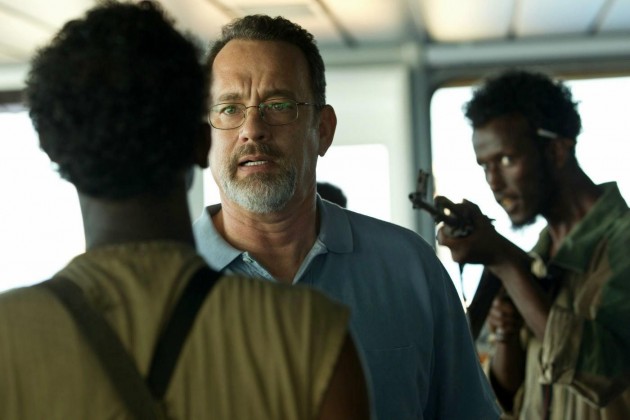‘Captain Phillips’ marries action, human connection in real-life drama

For some, the image most likely conjured up when the word “pirate” is uttered is that of Captain Jack Sparrow: the conniving and witty buccaneer played by Johnny Depp in Disney’s “Pirates of the Caribbean” franchise.
But in “Captain Phillips,” these pirates are not chanting, “Yo ho, yo ho, a pirate’s life for me” with a wink or sipping Captain Morgan rum out of brass mugs.
Piracy is the only way of life for the young men who live off the coast of Somalia with a thirst only for the riches that will free them from their impoverished plights and the control of tyrannical warlords.
Based on the true events of Captain Richard Phillips and his hijacked ship in 2009, Tom Hanks plays the task master captain, a man who deep down is consumed with love toward his family despite stringent demeanor toward his crew that is a façade to garner respect for his men on board the Maersk Alabama, a large cargo ship carrying supplies and food for developing countries across the tip of Africa.
There is a wonderful scene in the beginning of the film between Phillips and his wife, played by the always-reliable Katherine Keener. The audience sees the two driving to an airport in wintery Vermont, involved in a profound conversation about the complexities of the modern world and their concerns for their two children. Hanks displays his unease about where the world is going, how fast things have evolved, and if his two sons in college are equipped to handle the hardships after school.
The scene may seem innocuous at first, but it lays the foundation for who Phillips is – someone who contemplates every situation within his peripherals and has an awareness unlike his crew that exudes naïveté toward any dangers that might be lurking.
British director Paul Greengrass, who brought a nervous energy to the “Bourne Trilogy,” applies to the film his aesthetics of Direct Cinema, a genre with a fly-on-the-wall feel that started in the 1960s also known today as the documentary.
With shaky handheld cameras, quick zooms toward his subjects and rapid cuts, Greengrass’ temperament is tailor-made for this material.
Twenty minutes into the film, Greengrass throws viewers into the conflict that confronts Phillips and his crew: Three armed pirates from Somalia are aboard the ship, hoping to cash in on the treasure they envisioned from their rundown skiffs. Phillips comes face to face with the man he has seen only through binoculars – a thin, yellow-toothed leader of the crew named Muse (Barkhad Abdi). When both men confront each other, the audience knows their backgrounds, and sees two cultures colliding for very distinct purposes.
We are cognizant of what both men wish to accomplish from this experience: Phillips’ desire for his crew’s safety and Muse’s quest to hit it rich.
Greengrass and scriptwriter Billy Ray (“Shattered Glass”) manage to find symmetry between the action and the human connection between these two men. Phillips is aware that if he plays by Muse’s rules, the confrontation can be over rather quickly, but Muse, attempting to forge a façade similar to Phillips with his crew, is terse and threatening. His aura amplifies the verisimilitude of this chilling reenactment that is hypnotic and charged with so much tension that it will leave one grasping for a paper bag.
Hanks delivers the kind of performance we come to expect from the two-time Oscar winner, but the performance from Abdi warrants considerable consideration come award season. His performance makes you believe in Hanks’ portrayal of Phillips. Their scenes together during the more subdued moments in the film give viewers a time to reflect. A great example occurs toward the end when Hanks inquires, “There’s gotta be something other than being a fisherman or kidnapping people that you can do.”
Abdi gazes at Hanks for a few seconds with such despair and sorrow in his eyes, and replies, “Maybe in America.”
These few words offer us more insight into the challenging circumstances some are born into off American soil, and make us meditate long after we head for the exits from this remarkable film.
GRADE: A





